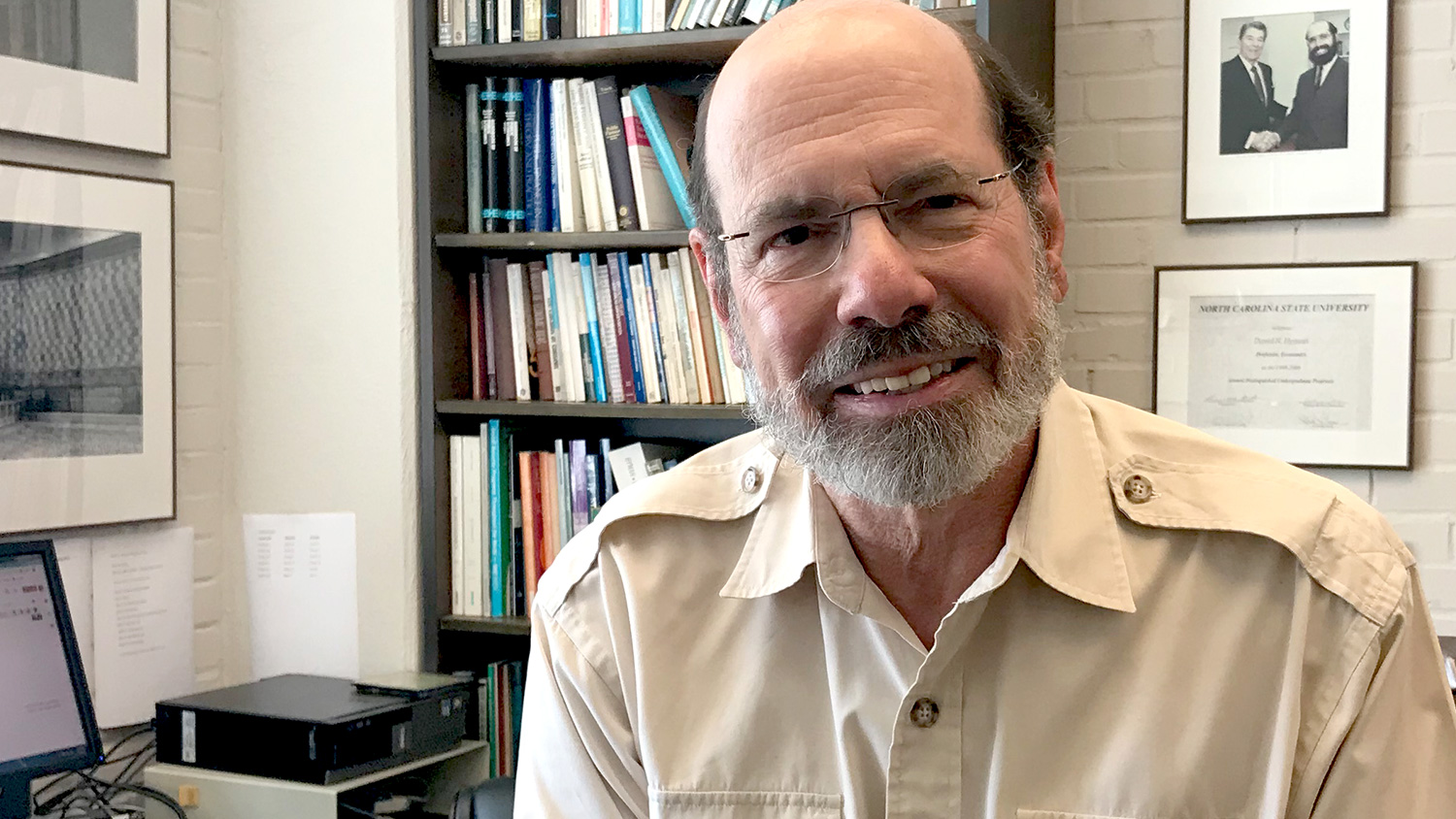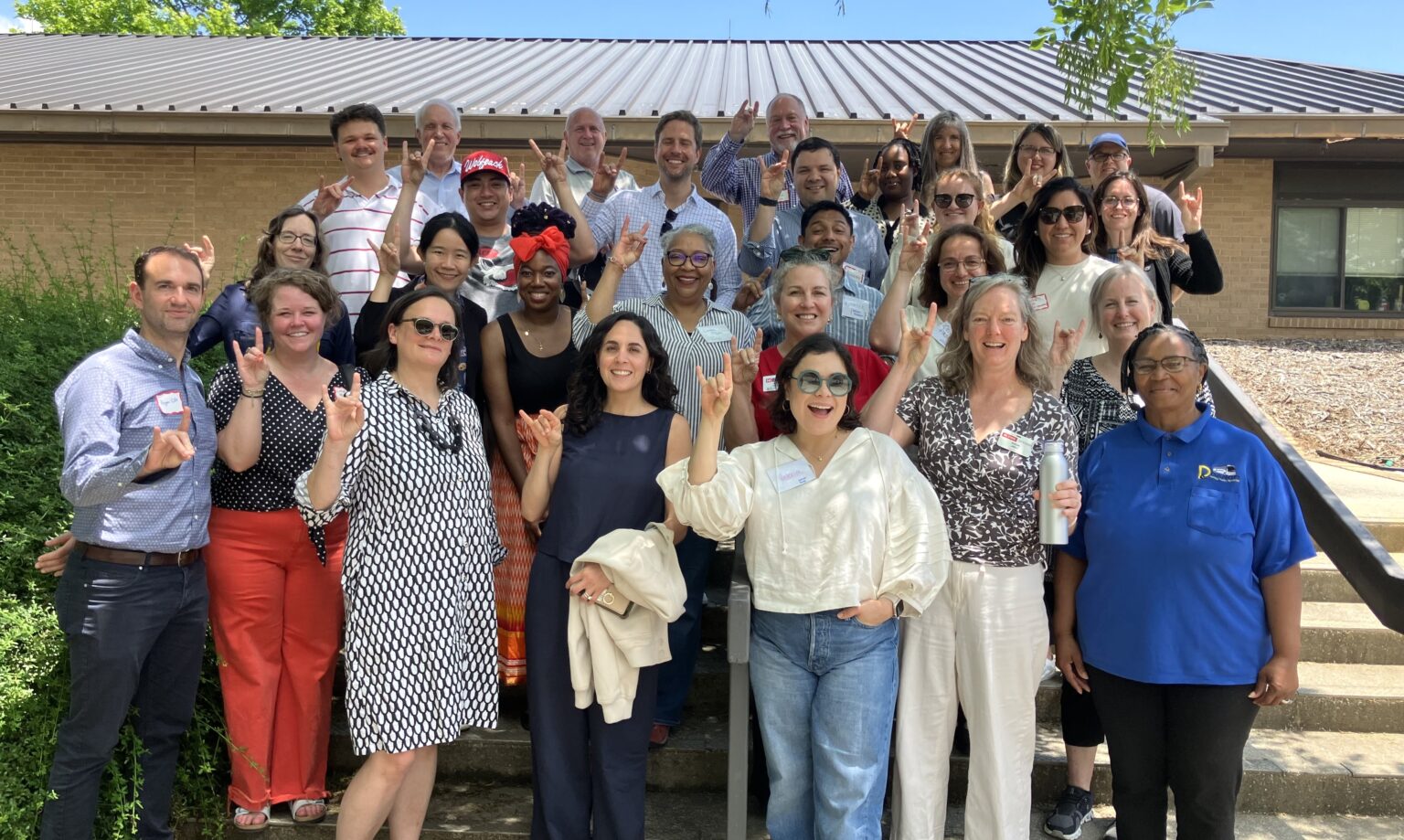David Hyman: Forming Informed Citizens for 50 Years

“Ignorance about economics leads to poor decision-making, and my goal is to educate students to understand how the economy functions and sometimes malfunctions, so they can be informed citizens,” said David Hyman, professor of economics at the NC State Poole College of Management.
Hyman began teaching at NC State in 1969, joining the faculty in the Department of Economics – one of the largest in the world at the time – with an appointment in liberal arts economics.
Others in the department had appointments in teaching, research and extension positions. The college of management was established in 1992, and now has four departments: accounting, business management, economics, and management, innovation and entrepreneurship.
In recognition of his 50th anniversary at NC State, Hyman responded to an email interview with Poole College communications, reflecting on his career. His responses are summarized below.
Enabling Students to Weigh the Pros, Cons
Hyman’s primary course – Fundamentals of Economics – is a mix of microeconomics and macroeconomics that gives students a survey of modern economic theory.
“I teach about markets, prices and how prices convey information for which individuals can weigh costs against benefits, and emphasize the importance of prices in influencing incentives,” he said.
He keeps the course fresh, he said, “by applying the theory I teach to current economic issues so students can see how economics is relevant and understand the pros and cons of various policies.” Over the years, Hyman estimates that he has taught more that 25,000 undergraduates at NC State. He also has taught graduate level courses in economics.
Hyman has seen a lot of changes since joining NC State, but one constant is his commitment to helping students understand economics and its role in decision making.
He had received an assistant professorship offer from NC State in 1968, but decided to stay at Princeton University for another year to complete his doctoral dissertation. When he re-entered the job market in 1969, the offer was renewed, and he accepted and agreed to teach courses in public finance and economic principles. He advanced to associate professor and received tenure in 1973, and then the rank of full professor in 1979.
“When I was asked to teach public finance in 1969,” he said, “I already had a strong interest in the field. I had worked for the Budget Bureau, the Treasury, and the Board of Governors of the Federal Reserve System in Washington during the summers when I was a graduate student doing research on government spending and taxation. The field of public finance was changing in the 1970’s, with more emphasis on how individuals react and cooperate through government institutions.
“When I started teaching the course, I decided to write a textbook for the new field. I called it ‘The Economics of Governmental Activity’ and it was published in 1972. Ten years later, I rewrote the book into an expanded version that was titled simply “Public Finance”. It is still in print, and Hyman is currently working on a 12th edition of that book. He also has conducted research on various topics in government expenditure and taxation.
In addition to teaching, Hyman coordinates instruction for the “Principles of Economics” course, working with and mentoring teaching assistants.
Perspective on Technology
“When I started teaching at NC State, there were no personal computers, no internet, no email, no word processing nor spreadsheet programs,” he said. “Typewriters were the norm and electronic calculators didn’t appear until the 1970s. Classroom technology consisted of chalk and blackboards and occasionally an overhead projector,” and engineering students used slide rules.
Now, he said, “technology brings numbers to our fingertips, with personal computers and smart phones doing things only the mainframes were capable of in the 1970s, and even more that we could not have imagined then. Google provides data and facts instantaneously, and communicating with students and keeping records is much easier.”
Hyman had taken a leave of absence from teaching in 1988 to serve as a senior staff economist at the Council of Economic Advisers during the Reagan administration. When returning to campus the next year, he was asked to teach a Principles of Economics course to more than 300 students as an experiment in Nelson Auditorium.
“There was no technology at the time in the auditorium. I used an overhead projector and a microphone that would not work half the time. However, the course was a success and I have been teaching it in the Nelson Hall Auditorium now for 30 years.
“But what a difference today: We have a state of the art audio and visual system in the auditorium, and I integrate music with my lectures and use colorful PowerPoint slide shows with good graphics,” he said. He also integrates up-to-date applications and humor into his lectures. “All that has certainly made my teaching more effective,” he said.
Accolades
In addition to his service during the Reagan administration, Hyman served as senior staff economist under the administration of George H.W. Bush. He also has been a guest scholar at the Brookings Institution and has worked as a government budget analyst and as an economist for the Board of Governors of the Federal Reserve System and the U.S. Comptroller of the Currency.
Hyman has received a number of accolades for his teaching excellence at NC State:, including
- Poole College Department of Economics Teaching Excellence Award, 2019
- NC State College of Management Board of Governors Award for Teaching Excellence, 2010 and 2012
- Alumni Distinguished Undergraduate Professor, North Carolina State University, selected in recognition of his teaching excellence.
Hyman is the author of several widely used textbooks in economics and has published scholarly articles in the National Tax Journal, Public Choice, the Journal of Economic Education, and other respected academic journals.
“David continues to provide outstanding classroom instruction for our students. To do something so well for so long is a remarkable accomplishment,” said Lee Craig, professor of economics and head of the Department of Economics at Poole College.
Beyond the Classroom
In addition to his teaching, Hyman is a self-taught photographer who has been exhibiting photographic art since 1978, and has won numerous awards for his work. His prints are in the permanent collections of museums in Washington, D.C., the Gregg Museum of Art and Design at North Carolina State University, and in corporate and private collections.
His photographs have been exhibited at shows in California, New York, North Carolina, and in China at the Pingyao International Photography Festival. Hyman has lived and traveled in Italy extensively since 1976, and has visited all the regions and provinces of that country. With his photography, he specializes and architectural details of places in that country. View a sampling of his work here and click here to access his collection at the Gregg Museum of Art and Design.
- Categories:


